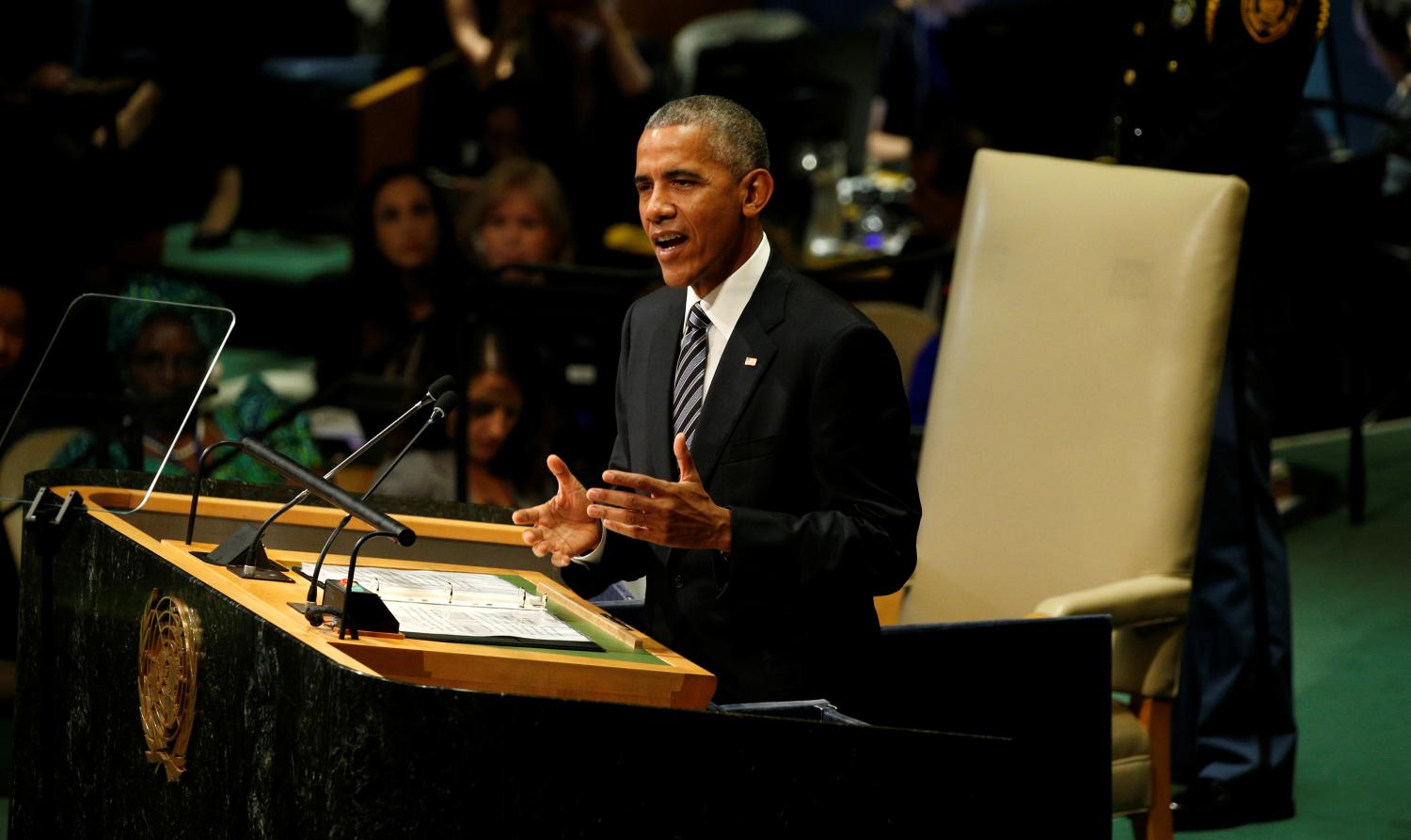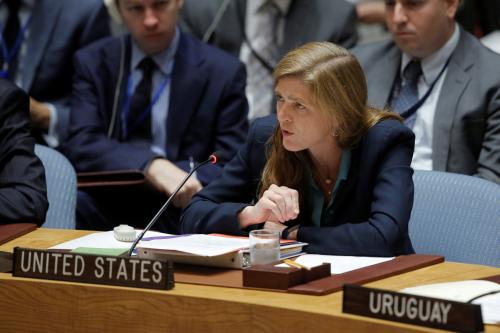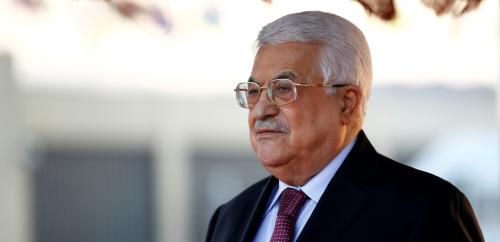Recent statements by White House and State Department spokesmen—strongly condemning an Israeli decision to advance plans for a new Jewish settlement in the West Bank (which Israel insists is an enlargement of an existing settlement)—have once again stirred a debate in Israel about the Obama administration’s intentions after the U.S election. Will it seek to leave a legacy for future Israeli-Palestinian talks?
Conventional wisdom among Israeli politicians, officials, and pundits in recent months has been “yes.” No longer shackled by political considerations after the November election, the thinking goes, the lame-duck administration would be able to pursue initiatives that the Israeli government fears—aimed at securing the longevity of the two-state solution in an environment in which peace is unreachable at present.
These Israelis speak of an eight-year political and personal score between President Barack Obama and Prime Minister Benjamin Netanyahu, which Obama may want to settle during his last months in office. They focus on possible steps that the administration may consider between November and January, which could set the stage for future efforts to resolve the Israeli-Palestinian conflict. Prominent Israelis suggest it is impossible that Obama would do nothing, because of his moral and ideological commitment to the Palestinian issue.
Obama and Netanyahu met in New York last month on the sidelines of the U.N. General Assembly. While Netanyahu said he did not specifically raise his concerns with the president, he did ask Secretary of State John Kerry a week later for the administration to remain consistent in its approach—and not allow the U.N. Security Council to adopt an anti-Israel resolution—during Obama’s last months in office. That would be a counterproductive move for future efforts to advance the Israeli-Palestinian peace process, in Netanyahu’s view.
What can the administration do?
It’s not clear that the administration has any intention of taking substantial steps on the Israeli-Palestinian front. However, as part of an Obama legacy, there are several actions it could realistically consider:
- Refrain from taking any steps and allow the next administration to start afresh;
- Deliver a presidential Middle East “parameters speech” a la President Clinton;
- Bring a “balanced” draft resolution for a U.N. Security Council vote as the new reference for future talks (rather than not veto possible draft resolutions by France or New Zealand, which are less balanced); and/or
- Abstain on a Palestinian move to bring a new draft resolution branding settlements as illegal (a revised version of the 2011 draft resolution, which the United States vetoed) to a vote at the Security Council.
Back in the spotlight?
While the talk of “score-settling” seems exaggerated, the Israeli-Palestinian conflict has resurfaced in recent weeks after months of American silence on the issue. In a September 14 statement after the signing of the 10-year, $38 billion security Memorandum of Understanding, Obama said:
“[W]e will continue to press for a two-state solution to the longstanding Israeli-Palestinian conflict, despite the deeply troubling trends on the ground. [For Israel,] the only way to endure and thrive as a Jewish and democratic state is through the realization of an independent and viable Palestine.”
In his final address to the U.N. General Assembly on September 20, the president added that “Israelis and Palestinians will be better off if Palestinians reject incitement and recognize the legitimacy of Israel, but Israel recognizes it cannot permanently occupy and settle Palestinian land.” Finally, in his meeting with Netanyahu on September 21, Obama raised U.S. concerns regarding Palestinian violence and Israeli settlement activity. That same week, in a closed meeting of donors to the Palestinian Authority in New York, Secretary Kerry reportedly criticized Israeli settlements policy, which is leading to a bi-national state reality, while urging the international community “to act on it, or shut up.”

Hard choices
From the outset in mid-2009, the Obama administration made serious efforts to advance talks between Israeli and Palestinian leaders, aimed at moving forward on the two-state solution, but these efforts failed, as the parties today seem further apart than they were eight years ago.
Reflecting on his legacy and the gravity of the continued impasse in the Israeli-Palestinian process—as well as what seems as the fading away of the two-state solution—the president may wish to leave his successor with additional tools that he thinks could be helpful in relaunching peace efforts soon after January 2017, rather than starting from scratch or spending crucial months in preparation to make such a move. A contrary argument is that any step by the outgoing president would tie the hands of the incoming president, as well as possibly lead to resentment by the parties, and therefore may be counterproductive.
Senior administration officials have recently encouraged Israel and the Palestinians to take concrete steps—such as for the Palestinians to stop violence and incitement, and for Israel to stop settlement activity and home demolitions—in order to improve the atmosphere between them and facilitate future negotiations. Even so, it’s not clear what concrete steps will Obama be willing to take regarding the Israeli-Palestinian conflict – including particularly on Israeli settlement policy, which is the main bone of contention between the U.S and Israel.
U.S. Ambassador to Israel Dan Shapiro offered a glimpse into the administration’s thinking in a recent TV interview on Israeli Channel 10. He acknowledged the president’s dilemmas, as he contemplates what (if anything) he can do before he leaves office. Shapiro mentioned that Obama may issue a “statement, resolution or initiative, perhaps in the U.N. or another international forum,” adding that in any case, the United States will not support one-sided initiatives.
President Obama and his advisors will consider next steps in the coming weeks. The incoming administration, for its part, will likely consult on the Israeli-Palestinian issue with the outgoing team. Especially if Hillary Clinton wins, it’s likely that Obama, Clinton, and their transition teams will coordinate on the modus operandi that the Obama administration should pursue in its last months. For this reason (and more), Netanyahu made it a point while in New York to meet with both presidential candidates, and urged them not to support any one-sided resolutions or initiatives at the United Nations. A Clinton presidency would most likely signal continuity of Obama’s vision in efforts to bridge the gaps between Israelis and Palestinians, and may find new tools helpful. A Trump presidency would most likely represent a break from Obama’s approach, would seek to start afresh with a new approach, and would probably reject new tools introduced by Obama.
It doesn’t seem likely that Obama would seek to impose a solution on the Israelis and Palestinians or support steps that are considered one-sided (e.g. abstention on a U.N Security Council resolution on settlements). A broader, balanced, U.N. Security Council resolution—which would serve as new reference for future talks—is an option, but given growing American-Russian tensions, it may be difficult for the two to reach common ground on an Israeli-Palestinian resolution.
Nevertheless, Obama will not leave the White House without addressing the Israeli-Palestinian issue, one final time, as president. An “Obama parameters” speech stands to be a safe option, leaving a mark, yet not tying the hands of the next administration. He could reiterate assertions he has made during his presidency, perhaps adding new elements. In his eulogy at Shimon Peres’ funeral in Jerusalem on September 30, he already called on the parties to continue the “unfinished business of peace.” An “Obama parameters” speech would likely include U.S recognition of Israel as a Jewish state and homeland for the Jewish people, as well as a (future) State of Palestine as homeland of the Palestinian people. It would call upon the parties to negotiate a border based on “the 1967 line(s), with mutually agreed swaps.” “different than the one that existed on June 4, 1967.” It would probably call upon Israel to halt new settlement activity, and at the same time state that the Palestinians must stop violence and incitement. In this context, the president would probably encourage the moderate Sunni regimes in the region to take on a larger role in the Israeli-Palestinian process, and would encourage Israel and Arab countries to enter normalization talks based on the Arab Peace Initiative of 2002.
The real wild card remains the U.S. election, of course—the outcome of which will profoundly affect what Obama chooses to do on Israeli-Palestinian matters.









Commentary
Does Obama really have a November surprise planned for Israel and the Palestinians?
October 17, 2016